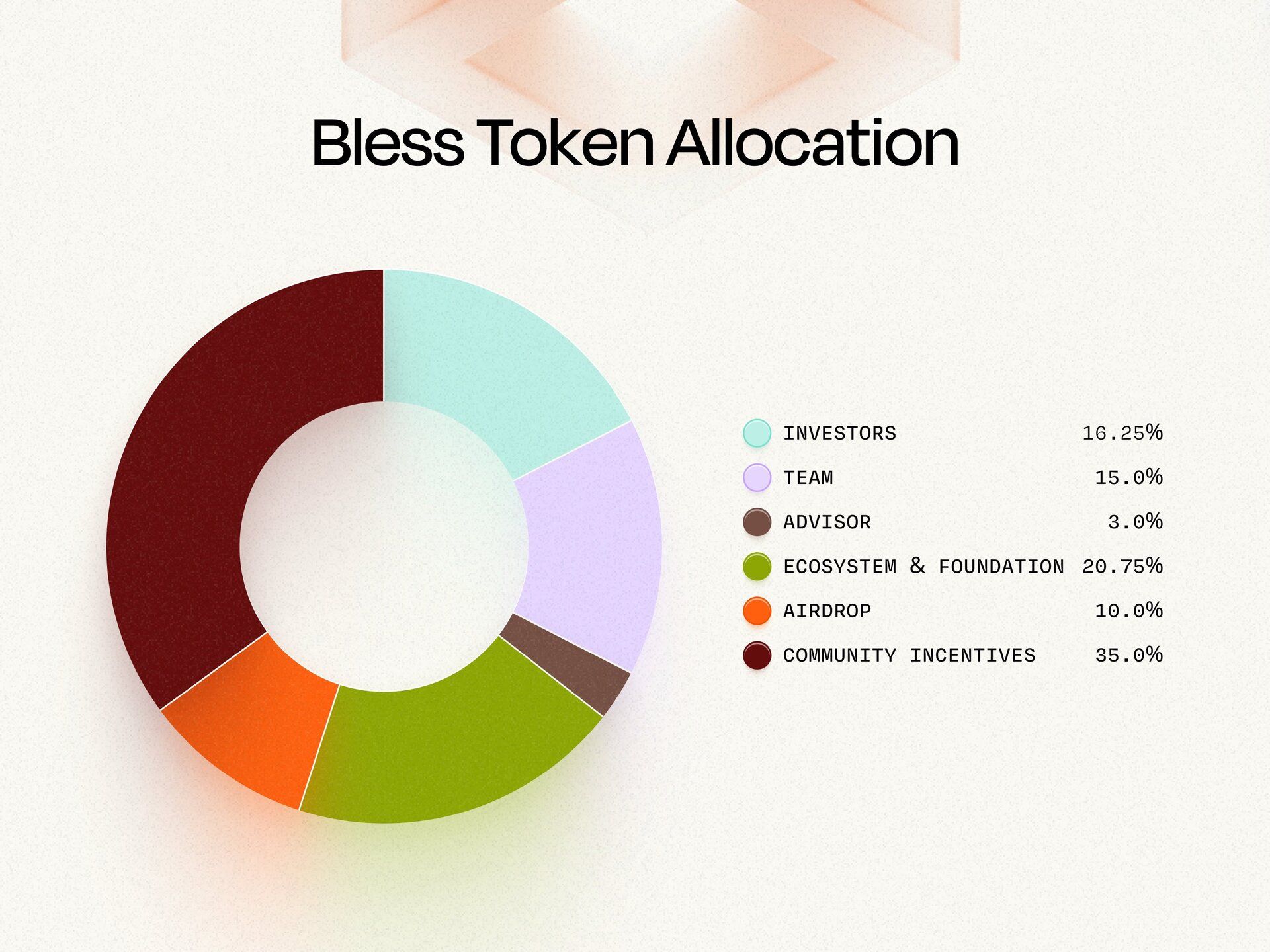1. Executive Summary
Bless Network emerges as a pioneering decentralized edge computing platform, positioning itself as the world's first shared computer. By harnessing idle CPU and GPU resources from millions of everyday devices, such as laptops, desktops, and mobile phones, Bless addresses the escalating demand for affordable, accessible compute power in the AI era.
Founded in 2022, the project has rapidly gained traction with over 6.3 million nodes and 2.5 million users during its testnet phase. Its native token, $BLESS, was recently launched and has achieved a market cap of approximately $48M and a fully diluted valuation of $258M.
Backed by $8M in funding from prominent investors like NGC Ventures and M31 Capital, Bless offers ultra-low latency compute for AI, gaming, and data processing, with up to 90% cost savings compared to centralized clouds.
While early, its community-driven model and integration with Solana signal strong potential in the burgeoning DePIN sector, though it faces competition from established players.
Today’s edition of the Token Metrics Research | Daily Newsletter is brought to you by Wallstreet Prep.
Learn Real Estate Investing from Wharton's Best Minds
In just 8 weeks, learn institutional-grade real estate analysis and modeling from Wharton faculty and seasoned investors.
You’ll gain:
Insider insights on how top firms like Blackstone and KKR evaluate deals
Exclusive invites to recruiting and networking events
Direct access to Wharton faculty and a certificate that signals credibility
Join a thriving community of 5,000+ graduates for ongoing career development, networking, and deal flow.
Use code SAVE300 at checkout to save $300 on tuition + $200 with early enrollment by January 12.
Program starts February 9.
Now, let’s get back to the deep dive.
2. About the Project
2.1. Vision
Bless Network's vision is to democratize access to computing resources, treating compute as a basic human right akin to electricity or water. It aims to bridge economic divides by creating a global, self-scaling mesh network that empowers users to contribute to and benefit from shared infrastructure, potentially evolving into systems that support universal basic income as device capabilities advance.
2.2. Problem
The core problem it tackles is the "AI computing crisis": centralized cloud infrastructure struggles to cope with the exponential demand driven by AI, leading to outages, high costs (e.g., training models like GPT-4 at millions of dollars), geographic accessibility barriers, and environmental strain from data center expansion. Public cloud spending is projected to hit $805B by 2024, yet issues like service interruptions and centralization undermine blockchain's decentralization ethos.
2.3. Solution
Bless's solution is a decentralized edge computing network that leverages billions of idle devices worldwide via a browser extension or app. Users opt-in to share resources in a trustless, verifiable manner, earning rewards while enabling applications in AI training/inference, gaming, research, and enterprise workloads. Key enablers include nested nodes for seamless integration and network-neutral applications (nnApps) for dynamic scaling.
3. Market Analysis
Bless Network operates in the Decentralized Physical Infrastructure Networks (DePIN) sector, specifically the decentralized compute subcategory, which focuses on distributing GPU/CPU resources for AI, machine learning, gaming, and data processing.
According to Messari, the sector could reach $3.5T by 2028, driven by AI adoption and the need for scalable, low-latency infrastructure. More conservative estimates suggest a $231B market by 2030 if adoption accelerates, with compute-focused DePINs capturing a significant share due to AI's projected $15.7T economic impact by 2030.

3.1. Competition
Bless differentiates itself through its edge-focused, browser-based accessibility, utilizing everyday devices, which contrasts with competitors that require specialized hardware or focus on high-end GPUs.
Project | Market Cap | Similarities with Bless | Differences with Bless |
~$420M | Both aggregate idle GPUs for AI/ML workloads, reward node operators, and focus on cost-efficient decentralized compute. | io.net emphasizes high-performance enterprise GPUs and cloud integration; Bless prioritizes edge devices for low-latency consumer access via browser extensions. | |
~$1.7B | Decentralized rendering and compute sharing; token-based rewards for contributors. | Render specializes in 3D/graphics rendering for media; Bless offers broader AI/gaming/enterprise use cases with dynamic verification and randomized task distribution. | |
~$281M | Open marketplace for cloud compute; uses idle resources with staking incentives. | Akash requires containerized deployments and focuses on server-grade hardware; Bless enables seamless, one-click participation from personal devices without setup. | |
~$220M | Peer-to-peer compute sharing for tasks like rendering and scientific computing. | Golem utilizes a requestor-provider model with WASM support, while Bless incorporates edge proximity for ultra-low latency and opt-in data marketplaces. | |
~2.1B | DePIN for GPU cloud in gaming/AI; community rewards and burns. | Aethir targets gaming ecosystems with dedicated nodes; Bless builds a "shared computer" for universal access, integrating behavioral data and achieving 5M+ nodes faster. |
4. Features
Dynamic Resource Matching: Matches tasks to devices based on latency, throughput, reliability, proximity, and availability for optimal performance.
Randomized Distribution: Employs Greco-Latin square algorithms for secure, unpredictable task allocation to prevent attacks.
WASM Secure Runtime: Provides sandboxed environments with memory safety, JIT compilation, and obfuscation for isolated, bank-level secure executions.
Dynamic Verification Mechanism: Flexible proofs (e.g., ZK, consensus) ensure computational integrity, backed by reputation systems.
Automatic Orchestration System: Monitors network health, enables sub-second failover, and routes geolocation-aware tasks like a ride-sharing platform.
Opt-In Data Marketplace: Leverages consent-based behavioral data from 5M+ nodes for research and AI training.
Easy Onboarding: Browser extension or desktop app for users to share idle resources and earn yields without hardware investments.
5. Token
The native token of Bless Network is $BLESS, operating on the Solana blockchain for fast, low-cost transactions. It has a maximum supply of 10 billion tokens, with a circulating supply of approximately 1.84 billion (18.4% of max) as of September 2025. Current price is around $0.026, with a 24-hour trading volume of $89M.

5.1. Utility
Staking: Node operators stake tokens to participate and secure the network, earning rewards proportional to contributions.
Payments: Used to pay for compute executions, with fees distributed to providers.
Governance: Holders influence protocol decisions, including upgrades and resource allocation.
Burn Mechanism: A portion of the network proceeds is burned to reduce supply and support value accrual.
This utility model incentivizes participation, aligns incentives, and drives deflationary pressure.

This edition of the newsletter is co-presented by I Hate It Here.
The best HR advice comes from those in the trenches. That’s what this is: real-world HR insights delivered in a newsletter from Hebba Youssef, a Chief People Officer who’s been there. Practical, real strategies with a dash of humor. Because HR shouldn’t be thankless—and you shouldn’t be alone in it.
Now, let's continue with the deep dive.
6. Team
Bless Network was co-founded in 2022 by a seasoned team with backgrounds in blockchain research, product development, and venture:
Derek Anderson: Co-founder, focuses on strategic growth and partnerships.
Butian Li: Co-founder, leads technical architecture and engineering.
Michael Chen: Co-founder and COO, former Binance Research analyst, brings expertise in crypto analytics and operations.
Liam Zhang: Co-founder and product lead, oversees user experience and nnApp development.
The team draws on experiences from Akash Network, Binance, and NGC Ventures, with a focus on decentralized infrastructure. While roles are not always publicly detailed, their collective track record in DePIN and AI positions Bless for execution.
7. Traction
Since its mainnet launch on September 23, 2025, Bless Network has demonstrated impressive early momentum, building on a robust testnet phase that attracted over 6.3 million nodes and 2.5 million participants.
This foundation has translated into strong post-launch adoption, with more than 800,000 daily active users engaging through the platform's Chrome extension, contributing to a vibrant ecosystem of shared compute resources.
The testnet's success culminated in an 8.5% airdrop allocation of 850 million $BLESS tokens, rewarding dedicated contributors and fueling further growth.
Key integrations, such as the partnership with Space and Time for verifiable AI agents on edge devices, have enhanced its utility in real-world applications.
Although total value locked (TVL) metrics are not yet applicable given its compute-focused model, the rapid node expansion, airdrop participation rates, and growing user base signal swift adoption within the AI and DePIN landscapes.
8. Investors
Bless Network secured $8M in funding through pre-seed and seed rounds in 2024, attracting a cadre of strategic backers specializing in DePIN and blockchain infrastructure.
Leading the investments were NGC Ventures and M31 Capital, both renowned for their focus on decentralized technologies and early-stage crypto projects. Additional support came from MH Ventures, No Limit Holdings, and Dewhales, with mentions of involvement from Interop and Plassa Capital in broader ecosystem contexts.

9. Conclusion
Bless Network emerges as a standout innovator in the DePIN arena, effectively addressing critical compute shortages through its accessible, community-centric approach that transforms everyday devices into a powerful shared infrastructure.
With explosive early growth, including millions of nodes, hundreds of thousands of daily users, and a successful token launch amid surging market interest, coupled with substantial cost efficiencies and a keen emphasis on AI applications, the project is well-poised to capitalize on the multi-trillion-dollar expansion forecasted for decentralized computing.
Yet, its trajectory will depend on sustaining robust security measures, forging deeper partnerships, and outmaneuvering rivals in a fast-evolving space.
For seasoned crypto investors and researchers, Bless embodies a promising wager on the future of decentralized systems, where monitoring ongoing metrics like node participation and ecosystem collaborations will be key to assessing its enduring impact.
Today’s newsletter is also powered by Mindstream.
Turn AI Into Your Income Stream
The AI economy is booming, and smart entrepreneurs are already profiting. Subscribe to Mindstream and get instant access to 200+ proven strategies to monetize AI tools like ChatGPT, Midjourney, and more. From content creation to automation services, discover actionable ways to build your AI-powered income. No coding required, just practical strategies that work.
That's all for today. Let's talk tomorrow.





